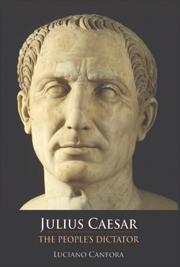Book contents
- Frontmatter
- Contents
- Translators' Note
- Acknowledgements
- Foreword
- PART I FROM SULLA TO CATILINE
- PART II FROM THE TRIUMVIRATE TO THE CONQUEST OF GAUL
- PART III THE LONG CIVIL WAR
- PART IV FROM THE CONSPIRACY TO THE TRIUMPH OF CAESARISM
- 29 Inklings of Conspiracy
- 30 ‘Iure caesus’
- 31 The Lupercalia Drama
- 32 The Dictatorship
- 33 Epicureans in Revolt?
- 34 The Hetairia of Cassius and the Recruitment of Brutus
- 35 A Conspirator's Realism: Cassius Settles for the Second Rank
- 36 Some Unexpected Refusals
- 37 Cicero – an Organiser of the Conspiracy?
- 38 The Serious Mistake of Dismissing the Escort
- 39 The Dynamics of the ‘Tyrannicide’
- 40 ‘Where's Antony?’
- 41 Caesar's Body: How to Turn Victory into Defeat
- 42 The Wind
- Chronology
- Bibliography
- Index
31 - The Lupercalia Drama
from PART IV - FROM THE CONSPIRACY TO THE TRIUMPH OF CAESARISM
Published online by Cambridge University Press: 05 August 2013
- Frontmatter
- Contents
- Translators' Note
- Acknowledgements
- Foreword
- PART I FROM SULLA TO CATILINE
- PART II FROM THE TRIUMVIRATE TO THE CONQUEST OF GAUL
- PART III THE LONG CIVIL WAR
- PART IV FROM THE CONSPIRACY TO THE TRIUMPH OF CAESARISM
- 29 Inklings of Conspiracy
- 30 ‘Iure caesus’
- 31 The Lupercalia Drama
- 32 The Dictatorship
- 33 Epicureans in Revolt?
- 34 The Hetairia of Cassius and the Recruitment of Brutus
- 35 A Conspirator's Realism: Cassius Settles for the Second Rank
- 36 Some Unexpected Refusals
- 37 Cicero – an Organiser of the Conspiracy?
- 38 The Serious Mistake of Dismissing the Escort
- 39 The Dynamics of the ‘Tyrannicide’
- 40 ‘Where's Antony?’
- 41 Caesar's Body: How to Turn Victory into Defeat
- 42 The Wind
- Chronology
- Bibliography
- Index
Summary
The most striking and theatrical incident was provoked by Antony, at the very moment when rumours of an imminent, openly monarchical shift in Caesar's aspirations were being nourished from several sides. Once again suspicion turned to the possible role of Cleopatra as the moving force behind the scenes, especially since she had borne Caesar a son. This led to a persistent rumour that the dictator was about to move his seat permanently to Alexandria. Suppositions concerning these alleged ‘Oriental’ plans were finally shown to be false only when Caesar's will was read after his death. Then not only was the preeminent position of Octavius seen, but also the complete absence of Cleopatra's son from Caesar's testamentary arrangements. Also exploited was the alleged Sibylline prophecy according to which only a king would be able to defeat the Parthians. And soon the name was put about of the man who would place before the Senate the proposal which logically flowed from that prophecy.
As for Antony, he was no longer openly out of favour with Caesar: on the contrary, he was his colleague in the consulate for the year 44 bc. But he was not reappointed magister equitum, and had to resign himself to being appointed consul suffectus (deputy consul) by Dolabella. On 15 February 44, during the festival of the Lupercalia, he became the central figure in a spectacular event: an attempt to crown Caesar king.
- Type
- Chapter
- Information
- Julius CaesarThe People's Dictator, pp. 281 - 286Publisher: Edinburgh University PressPrint publication year: 2007



